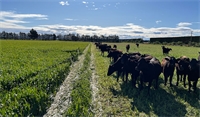Identifying diverse herbicide options
WORDS & IMAGES PROVIDED BY FAR
With herbicide resistance rising in New Zealand, arable farmers are being warned not to continually rely on the same chemical products or risk weeds developing resistance.
Foundation for Arable Research (FAR) senior field officer Ben Harvey says it is crucial to identify diverse herbicide options with different Modes of Action for key grass weed species.
For the last four years, FAR has conducted a trial assessing the efficacy of various commercially-available and experimental herbicides against a range of key grass weeds. To assess crop safety, some key crop species, including ryegrass, linseed, wheat and barley, were also included.
In 2024, the trial moved to Kowhai Farm, near Lincoln, after three years at FAR’s Chertsey arable research site, near Ashburton.
A key aim for this trial is to identify herbicides that are from different chemical Modes of Action than those where herbicide resistance has been identified in New Zealand (post-emergence herbicides Groups 1 and 2). This included five new or unregistered herbicides identified only by a code. Pre-emergence herbicides were also in the trial, as these act with a different Mode of Action to Groups 1 and 2, and are important tools in fighting herbicide resistant weed populations, Ben Harvey says.
The trial uses a special sprayer that starts at a high herbicide rate and dilutes as the sprayer moves down the row, giving results for a range of rates between double the label rate and a quarter of the label rate.
Results were also obtained for broadleaf weeds, using the background weeds present at the site. Some products were particularly effective against a range of broadleaf weeds, as well as the grass weed species planted for the trial.
In addition to resistance to Group 1 and 2 herbicides, the potential emergence of glyphosate resistant weeds in arable adds further importance to herbicide choices, Ben Harvey says.
“Growers should always be vigilant and follow up on any patches of weeds that appear to have survived herbicide application.” Assistance is available through FAR and agrichemical company representatives.
Some key results from the trial:
- Pre-emergence herbicides, especially from Group 15 (e.g. Firebird, Sakura) remain a key chemical tool against herbicide resistance.
- Groups 1 and 2 are very effective when herbicide resistance is not present, and should remain a part of herbicide programmes where appropriate.
- The coded products, while mostly less effective than other herbicides, are mostly designed to be used in mixes and sequences. Some are particularly targeted at being effective on herbicide resistant weed populations when used as a partner with other herbicides.
- Prominent (prometryn) is being investigated for a possible role in Vulpia hairgrass control in ryegrass seed crops. While it shows promise, especially in annual ryegrass, more work is required to identify appropriate rates and timings.
The full trial results are now available on the FAR website as an Arable Update.
Related

A technique which significantly reduces the spread of weed seeds during harvest is being demonstrate...
Read More

While monoculture crops have become the norm, this wasn’t always the case.
Read More

Pasture renewal is a crucial practice for improving the productivity and profitability of a farm. By...
Read More

There is something interesting happening in the back paddock at the Foundation for Arable Research’...
Read More